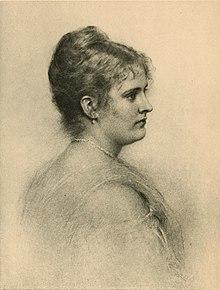Maud Howe Elliot | |
|---|---|
 | |
| Born | November 9, 1854 Boston, Massachusetts |
| Died | March 19, 1948 (aged 93) Newport, Rhode Island |
| Notable awards | 1917 Pulitzer Prize |
| Spouse | John Elliott |
Maud Howe Elliott (November 9, 1854 – March 19, 1948) was an American writer, most notable for her Pulitzer prize-winning collaboration with her sisters, Laura E. Richards and Florence Hall, on their mother's biography The Life of Julia Ward Howe (1916). Her other works included A Newport Aquarelle (1883); Phillida (1891); Mammon, later published as Honor: A Novel (1893); Roma Beata, Letters from the Eternal City (1903); The Eleventh Hour in the Life of Julia Ward Howe (1911); Three Generations (1923); Lord Byron's Helmet (1927); John Elliott, The Story of an Artist (1930); My Cousin, F. Marion Crawford (1934); and This Was My Newport (1944).[1]
Biography
Maud Howe was born on November 9, 1854 at the Perkins School for the Blind in Boston, founded by her father, Samuel Gridley Howe. Her mother was the author and abolitionist Julia Ward Howe. In 1887 she married English artist John Elliott. A socialite, Elliott was one of the founding members of the Society of the Four Arts in Palm Beach, Florida[2] She was the honorary president of the organization until her death.
After her marriage, she lived in Chicago (1892–93) and Italy (1894-1900/1906-1910), before moving to Newport where she spent the rest of her life. She was a founding member of the Newport Art Association, and served as its secretary from 1912–1942.[1] Howe was also a founder of the Progressive Party and took part in the suffrage movement.[3]
She died in 1948 in Newport, Rhode Island.
References
- ^ a b Maud Howe Elliott Archived 2017-12-30 at the Wayback Machine, Redwood Library website. 2014-05-21
- ^ [1] The Society of the Four Arts 1936-1996. 2015-11-04
- ^ Polichetti, Barbara. "Maud Howe Elliott 1854–1948. 'Noted daughter of a famous mother'" in Women in R.I. History. Making a Difference. The Providence Journal Company, 1994. p. 18.
Bibliography
- Boyer, Paul S. "Howe, Julia Ward" in Notable American Women 1607–1950. Cambridge, MA: The Belknap Press of Harvard University Press, 1971. 2:225-229.
- Grinnell, Nancy Whipple, Carrying the Torch. Maud Howe Elliott and the American Renaissance. University Press of New England, 2014.
- Elliott, Maud Howe, Three Generations. Boston, Little, Brown, and Co. 1923. (Full text available in the Internet Archive)
External links
- Works by Maud Howe Elliott at Project Gutenberg
- Works by or about Maud Howe Elliott at Internet Archive
- Maud Howe Elliott. Rhode Island Heritage Hall of Fame web page. 2014-05-21.
- Maud Howe Elliott Papers, 1882-1948 Finding Aid, John Hay Library, Brown University. 2014-05-21. The collection includes unpublished manuscripts for Elliott's memoirs "Afternoon Tea" and "Memories of Eighty Years."